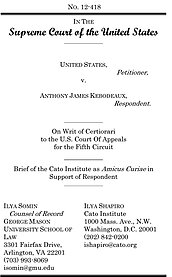With Professor Ilya Somin of George Mason University School of Law acting as counsel, the Cato Institute filed an amicus brief arguing that it would be improper under the Necessary and Proper Clause to permit Congress to have unending authority over all Americans. Congress already lacks a general power to punish criminals, much less monitor previously released criminals and impose new and onerous restrictions on them at will. Indeed, if the Court rules in favor of the government’s position, it will give Congress virtually unlimited power to regulate nearly all Americans. In essence, it would justify the gradual imposition of endless new requirements on anyone who had previously been subject to federal jurisdiction. Cumulatively, these federal impositions amount to unlimited federal authority over anyone who has ever been held in federal custody or otherwise in federal jurisdiction. This cannot be a power vested in a Congress with “few and defined” powers. As the Supreme Court held in the Obamacare case, Congress doesn’t have the power to “regulate an individual from cradle to grave.”
United States v. Kebodeaux
Learn more about Cato’s Amicus Briefs Program.
Last year’s partial victory in NFIB v. Sebelius (the Obamacare case) is already being applied to new cases reaching the Supreme Court. Recall that, in that case, the Court accepted our argument that the government cannot use the Commerce and Necessary and Proper Clauses to compel someone to purchase health insurance. The Court held that allowing Congress to compel commerce into existence would be an improper use of a great and limitless power. In United States v. Kebodeaux, the Supreme Court will once again address an assertion of power that, if upheld, could give Congress nearly limitless power. In 1999, Anthony Kebodeaux was sentenced to three years in prison for statutory rape. He served his time, was freed from any post-release parole or probation requirements, and ended his relationship with the federal government in the matter of criminal law. Years later, when Kebodeaux moved intrastate from San Antonio, Texas to El Paso, Texas, he failed to update his change of address within the three-day period as required by the federal Sex Offender Registration and Notification Act (SORNA) of 2006. Even though Kebodeaux was unconditionally released from custody before SORNA was enacted, he was sentenced to one year in federal prison. The Fifth Circuit overturned his conviction en banc, meaning that every judge on the Fifth Circuit heard the case rather than the traditional three-judge panel. They found the registration requirement unconstitutional because Congress lacked jurisdiction over Kebodeaux after they unconditionally released him from custody. The government’s arguments to the contrary, the court held, would permit not just “unending criminal authority” over Kebodeaux but unending authority over every American who was once in federal jurisdiction, which is, of course, every American.



